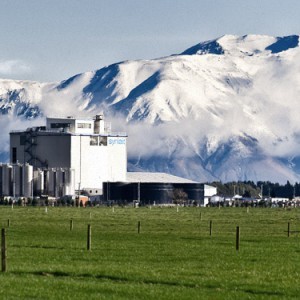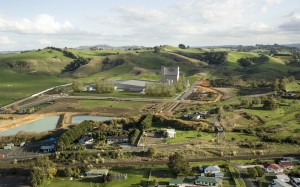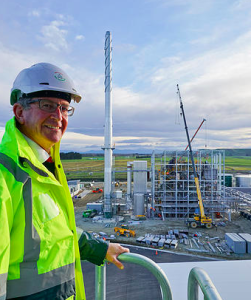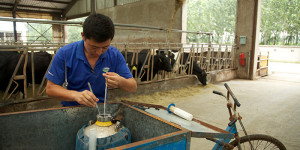 Chinese investment New Zealand agriculture is a controversial topic. Should we be selling iconic New Zealand farms such as Lochinvar Station to Chinese investors? The recent announcement of the purchase of Lochinvar Station by Shanghai Pengxin Group Co Ltd has brought the issue of Chinese investment to the surface again. The following article was written by Leanne Clemens as part of the Lincoln University course “Agribusiness Strategic Management” which I teach. This article provides a student perspective on Chinese investment New Zealand agriculture
Chinese investment New Zealand agriculture is a controversial topic. Should we be selling iconic New Zealand farms such as Lochinvar Station to Chinese investors? The recent announcement of the purchase of Lochinvar Station by Shanghai Pengxin Group Co Ltd has brought the issue of Chinese investment to the surface again. The following article was written by Leanne Clemens as part of the Lincoln University course “Agribusiness Strategic Management” which I teach. This article provides a student perspective on Chinese investment New Zealand agriculture
Leanne has just completed a Bachelor of Commerce in Agribusiness and Marketing at Lincoln University.
Chinese investment in New Zealand agriculture is positive as it allows for growth of the industry. A controversial issue, land sales to foreign owners in particular gains much attention however, there are a number of aspects that benefit New Zealand and ultimately lead it toward it being a positive move. The following report details how Chinese investment in New Zealand agriculture takes advantage of the market opportunities and access within China, allows growth of New Zealand firms, furthers the relationship between the two countries and creates jobs and opportunities for New Zealanders. In contrast to those views, the report will examine why fears of Kiwis of losing land to foreigners is largely unwarranted.
 The New Zealand government has a clear focus on international trade and the Prime Minster believes increased Chinese investment is inevitable. The NZ Inc. China Strategy has the goal to increase bilateral trade to levels that reflect the growing commercial relationship. This will see two way investment rise and more resources allocated to encourage focused investment from China. Similarly, New Zealand relies on overseas investment to achieve economies of scale and gain access to markets and consumers. Even historically New Zealand has been home to investment from foreign firms dating back to the 1800’s in industries such as sealing, flax and timber.
The New Zealand government has a clear focus on international trade and the Prime Minster believes increased Chinese investment is inevitable. The NZ Inc. China Strategy has the goal to increase bilateral trade to levels that reflect the growing commercial relationship. This will see two way investment rise and more resources allocated to encourage focused investment from China. Similarly, New Zealand relies on overseas investment to achieve economies of scale and gain access to markets and consumers. Even historically New Zealand has been home to investment from foreign firms dating back to the 1800’s in industries such as sealing, flax and timber.
Deputy Prime Minister Bill English believes that foreign investment between China and New Zealand is critical, and that our economy and living standards depend on the prosperity of our trading partners. Without this foreign investment he warns that New Zealand would face an increase in the cost of capital leading to reduced employment options, restriction to business growths and a decline in household incomes as a nation that doesn’t save enough to meet the demands for growth, investment allows us to meet those needs. As China is one of the fastest growing economies and New Zealand’s future growth depends on access to capital, knowledge and skills it is only natural that China would be interested in investing in New Zealand.
New Zealand Trade and Enterprise [NZTE] are at the front of this movement toward foreign investment, and in particular China. Advocating that “safety, stability, ingenuity, and proximity to Asia’s booming economies are just a few of the reasons to invest in New Zealand. NZTE also believe that Chinese investors can inject well needed market knowledge, networks, expertise and capital to a New Zealand firm. NZTE’s mandate is helping potential investors take advantage of what New Zealand has to offer. For example, NZTE and the Taupo District Council are currently looking for Chinese investors for what is dubbed a ‘mega-mill’ in the central North Island. With China as the largest export destination for wood products a joint venture with a Chinese firm could help get more value out of the logs and give it the capital required to create the scale needed.

Foreign investment also provides a source of capital allowing expansion such as the case of Synlait Milk and Bright Dairy of China. In 2010 the two firms became partners, giving Synlait Milk the capital required to expand and build its infant formula plant and gain good market access in China through partnering with one of the leading dairy companies. Since then Synlait Milk have gained momentum and now employ over 150 staff, have recently listed on the New Zealand share market and picked up an award at the China Business awards. As an example, the partnership between China and New Zealand has had benefits for both parties and has created a number of job opportunities in the Selwyn district and given milk suppliers other options in supply.

Congruent with providing a source of capital to allow expansion Eion Garden, Chairman of Silver Fern Farms stated that one of the major challenges within the meat industry is the lack of capital. Silver Fern Farms have recently created a joint venture project with an American firm and will be constructing a $22m plant in Palmerston North. This demonstrates how foreign investment can provide the capital needed to grow an entire industry.

A further example of positive outcomes from Chinese investment in the New Zealand agriculture is Chines Dairy Company, Yashili’s plans to build a $210 million milk processing plant in Pokeno. Yashili is one of China’s largest infant formula and soymilk powder makers. Residents are happy with the plan as it will bring at least 100 jobs to the area. The town is looking forward to the growth opportunities for new businesses with a 7000 person population jump expected. Yashili will be using New Zealand suppliers, boosting employment and paying taxes here, all which will benefit the New Zealand economy.
Some might argue that the benefits of foreign investment by the Chinese does not outweigh the disadvantages and wish to keep New Zealand assets in New Zealand hands. A survey in 2011 showed that Kiwi’s wanted to benefit from exporters, rather than foreigners benefiting from exports. Farm ownership in particular is a sensitive issue, exacerbated by the attention of the Crafar Farms sale to Shanghai Pengxin. The sale saw significant opposition from within New Zealand and ultimately led to a review of the Overseas Investment Act. China is also aware of New Zealand’s concerns about land purchases to which the Chinese Ambassador stated that Kiwi’s ‘over thought’ the issue, signalling that further large land acquisitions were unlikely.
The Overseas Investment Act underpins the investment goals of NZ Inc. strategies. Since the Crafar Farms acquisition it is now a more difficult and timely process to gain consent to purchase in New Zealand. A spokesman for Bill English states that “we have tightened the rules on foreign so that foreign investors have to show there will be real and tangible benefits to New Zealand if they want their application approved”. Proving this is not simple and the Act regulates purchases of sensitive land, significant business assets and fishing quotas. John Key has also made it clear to China in recent talks that he would welcome investment, so long as it benefits New Zealanders and it not attempts at buying up farms. This Act is in place to ensure that New Zealander’s don’t lose one of its most precious resources; land, and part of what makes it unique as a country.

Not only are there specific regulations surrounding overseas investment one could argue that Chinese foreign investment has been exaggerated by the media. Currently foreign direct investment between the two countries is relatively small. A report by KPMG it showed that in the three year period ended 31 January 2012 Asia only accounted for 16% of gross foreign direct investment, with Australia far ahead. However, the report did state that investment from China was likely to rise with such investments as Yashili in the dairy sector. Looking specifically at land acquisitions KPMG show that China / Hong Kong are 14th while the UK and United States are major investors in land (for the three year period ended 31 March, 2012). While common conceptions are that China are dominating investment in New Zealand the statistics show a different story with Australia, North America and Europe accounting for around 70% of investment over that time period.

The relationship between China and New Zealand has also paved the way for New Zealand investment in China. Fonterra has plans for 15,000 cows in China with the goal to produce one billion litres every year by 2018. This allows a New Zealand company to export its technical prowess and skills in milk production while taking advantage of the opportunities of being so close to its market. Like Chinese firms investing in New Zealand, Fonterra will be hiring local staff which benefits those regions.
Ultimately foreign investment in New Zealand by the Chinese is a positive move as it creates scope for growth. Historically New Zealand has been tied to foreign investments as the country does not have the wealth of older countries. Foreign investment allows New Zealand better market access, such is the case with Synlait Milk and Bright Dairy, and it also provides well needed capital to fund expansion, such is the case with the proposed ‘mega-mill’. The investment also provides opportunities through jobs which creates a growth in wages, and contributes to improving New Zealand’s standard of living. Despite the concerns about land acquisition by the Chinese the Overseas Investment Act ensures that investment will benefit New Zealanders.

Perhaps the government should consider a royalty arrangement with annual assessment based on the value derived by the purchaser, and that would be set put into a national trust that could be used to lend to NZ companies or start-ups that want to establish operations offshore and which need the assistance?
And if there is no value derived by the purchaser, say for any contiguous 24 months, the property must be put up for auction in NZ with the trust earning a fee based on the auction price.
Just a couple of thoughts.
Perhaps we should ask: if this investment is coming from US or Australia, will there be such objection? Or is this politically motivated with the opposition fanning this up into a frenzy?
Of course, there is always the argument that foreign investors cannot invest freely in China, so why should we allow them to invest in NZ. But Fonterra managed to. For those who use this argument, how many Kiwis are willing to put their money into a country where they don’t even understand the language? Or is this yet another empty argument?